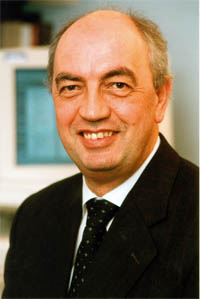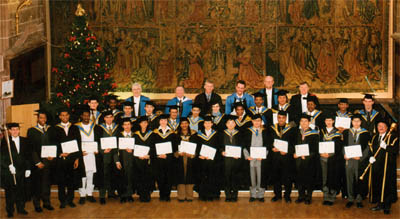“The most valuable asset of any organization is its
human resources!”
 David Mellor David Mellor
President, Cable & Wireless Virtual Academy
From
Buenos Aires to Valletta and now Istanbul we meet to review how best the ITU can
assist the communications sector with its development. Particular emphasis is
placed on how the developed nations can create opportunities for
improvement of the least developed countries (LDC).
The most valuable asset of any organization is its human
resources!
In Buenos Aires in 1994, ITU was instructed by its Members to
develop a “Global Telecommunications University” and this request was
reiterated at the Valletta Conference four years later. Today, this is becoming
a reality thanks to the Telecommunication Development Bureau (BDT) and the
private sector working together.
Not only has BDT coordinated on-line training courses, but it
has also, in conjunction with a number of universities, commissioned
post-graduate programmes to address the specific shortfalls in knowledge which
are so desperately needed by the LDCs.
In December 2001, a group of graduates received a Master of
Communications Management (MCM) award from the University of Strathclyde in
Scotland. The private sector and BDT are working together to ensure that such
programmes as the MCM are delivered online via the Internet in at least three of
the ITU languages, namely English, French and Spanish.
Although management of human resources and technology are
critical skills for operating communication networks, the LDCs still require
engineering competencies and thanks to the University of Dalhousie in Canada an
innovative programme covering Internetworking is being developed which will also
be available online.

In December 2001, a group of graduates received a Master of Communications
Management
award from the University of Strathclyde in Scotland
(ITU 020027)
|
Last November at ITU TELECOM AFRICA 2001, ITU and Cable &
Wireless signed a cooperation agreement committing the Cable & Wireless
Virtual Academy to the provision of a number of scholarships each year to enable
the LDCs to benefit from its portfolio.
Organizations such as the United States Telecommunications
Training Institute (USTTI) and the United Kingdom Telecommunications Academy
(UKTA) have played a vital role through their member organizations in the
provision of training materials. Since entering the new millennium, both
organizations have recognized the benefit of supporting taught programmes with
on-line knowledge.
Critical to the enhancement of skills in Africa are the “Centres
of Excellence”, which came about as a result of the ITU making extremely
effective use of the surplus funds generated by its TELECOM Exhibition
programme. The purpose of the Centres of Excellence is to develop programmes
that enable strategic high-level initiatives to be created.
Today, the ITU Global Telecommunications University is a
truly virtual organization addressing the needs of the Union’s membership.
Africa must be congratulated for hosting the Youth Forum at
ITU TELECOM AFRICA 2001, which demonstrated once again how ITU and the private
sector by working together, created an opportunity for some very bright
individuals from across the whole continent to meet and explore the world of
telecommunications. This initiative must continue since the youth of today are
the leaders of tomorrow.
We meet in Istanbul for the third World Telecommunication
Development Conference and this is clearly the opportunity world leaders of the
communications industry must take to determine how developments over the past
eight years can be enhanced for the future.
Last year in Coventry, participants from around the world
explored the e-Culture and concluded that this is the future whether it be
e-Government, e-Banking, e-Taxation, e-Media, e-Commerce, e-Education or
e-Training. The ‘e’ is with us now, and in the future will play a critical
role in our efforts to aid the bridging of the digital divide.
This year UKTA will host a conference on “Wireless Access
to the Information Society”, which it believes will enable discussion to take
place as to how the next generation of mobile products will assist in the
provision of increased access to information.
The rapid changes in technology over the past eight years
have created considerable pressure on operators in the developed and developing
countries and this has resulted in a very different skill-set being required by
the human resources of the organizations.
Globally, we have seen a move towards liberalization of the
communications sector. When competition is introduced, the government of the
country needs to ensure that both the incumbent and new entrants have a fair
chance of conducting their businesses. To do this, a regulator is required, laws
need to be revised and a new Telecommunications Act needs to be produced. The
regulator is a vital human resource and his or her skill-set is quite unique and
critical to the successful introduction of competition. The incumbent operating
company will invariably have been a part of the Ministry of Posts and
Telecommunications and heavily engineering led. The skill set required is a
lean, highly efficient organization with a strong marketing/selling portfolio.
The human resources need to be changed or re-educated before the technology for
the successful introduction of competition.
The challenges facing the human resources of the membership
of ITU’s Telecommunication Development Sector (ITU–D) will be addressed, and
together we will bridge the digital divide!
|